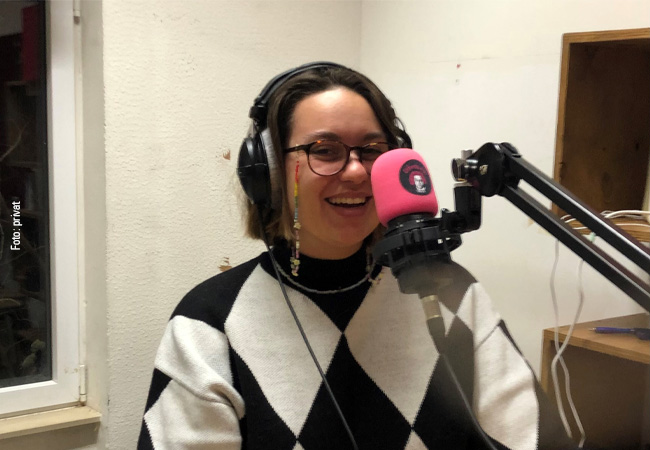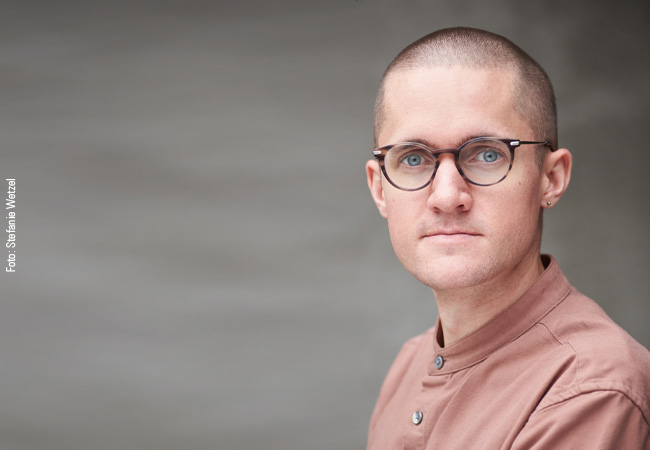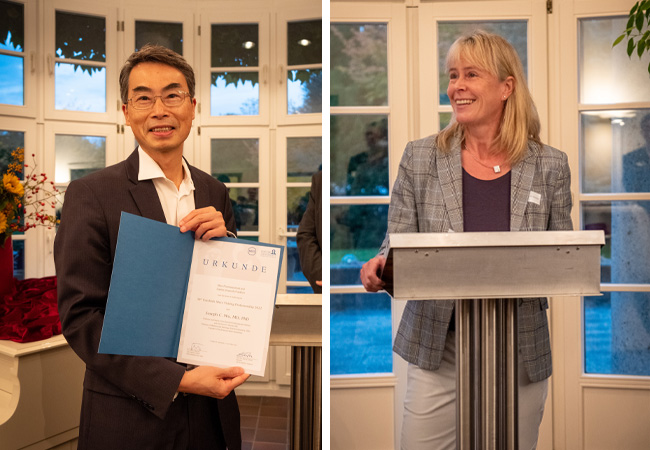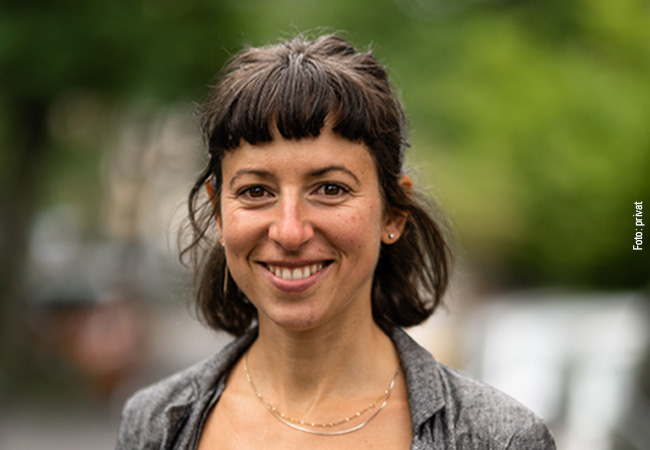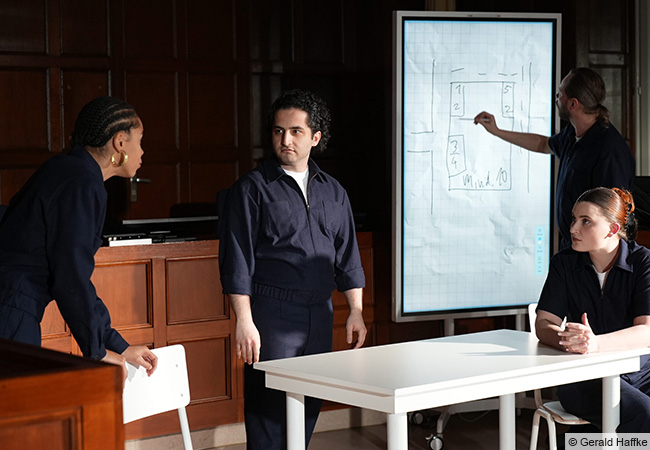To mark its founding year, Goethe University’s Sustainability Office organized an event at the end of 2022 to discuss the current state of sustainability at the university. All told, some eighty university members attended the event, which included a panel discussion centered on the question: „How do we shape change together?“ A report by Lilly Gothe, Goethe University Sustainability Office.
The evening was moderated by Anna Struth (University of Hohenheim) and Tim Brauer (Kiel University) from netzwerk n e. V., a student association that promotes socio-ecological transformation at German universities. At the outset, moderator Struth invited the audience to form small groups, co-called “marble rounds”, and discuss sustainability in everyday life on campus. These discussions were followed by a vote: Attendees used color cards to assess the implementation of sustainability at the university using a traffic light system. Only yellow and red cards were held up, all green cards remained unused.
Involving all status groups
The podium included representatives of all status groups. The only exception was the representative of the administrative-technical employees, who had to cancel at short notice. Dr. Albrecht Fester, Goethe University Vice President for Finances and Administration, agreed to step in at short notice, contributing his expertise in university operations. Right at the beginning, Goethe University President Prof. Enrico Schleiff, who is driving the development towards a sustainable university as a strategic field of action, pointed to the cubes positioned in the room, which refer to the UN’s 17 Sustainable Development Goals: Sustainability, he said, is much more than climate protection. Paula Paschke (Faculty of Roman Catholic Theology) pointed out the importance, for mid-level faculty and scientific staff especially, of anchoring sustainability within existing structures and integrating it into teaching. Thanks to his expertise in atmospheric research, Prof. Joachim Curtius was repeatedly able to feed in facts about greenhouse gas emissions. In her statement, biological sciences student Behgol Pashm Forosh referred to the protests in Iran and, like Goethe University President Schleiff, pleaded for sustainability to be understood as a global task of justice. During the course of the evening, audience members repeatedly took a seat on the two free chairs on the stage to contribute their own points of view.
The path to climate neutrality
The term „climate neutrality“ came up repeatedly as a keyword. In the first block, Svenja Maier of the Sustainability Office presented the plan for achieving this goal: with the entire university working together, the overall greenhouse gas emissions will be calculated in 2023. Vice President of Finances and Administration Fester pointed out that Goethe University is already well-positioned in the field of energy. Taking a seat on the podium, an audience member who works in the University Computing Center (Hochschulrechenzentrum, HRZ) criticized the university’s handling of mobility, saying he believes the focus is too narrow and centered on private motorized transport. In response, President Schleiff pointed to the Hessian state ticket as a good alternative. Professor Curtius emphasized the importance of mobility in university sustainability: for example, air travel alone constituted 50 percent of emissions at ETH Zurich. In the wake of this, moderator Tim Brauer asked Dr. Fester about the implementation status of the Senate resolution on the reduction of air travel. The Vice President for Finances and Administration pointed out that while formal implementation still takes time, everyone is called upon to take the resolution to heart in his or her travel planning.
Sustainability Officers
Program Coordinator and Equal Opportunities Officer Paschke emphasized the importance of the faculties when it comes to implementation. She proposed the establishment of sustainability officers, following the model of the decentralized equal opportunity officers in the faculties. A staff member from the Center for University Sports interjected, saying such a model could shift the assumption of responsibility. President Schleiff agreed, adding that it is important to encourage the university community to take „ownership“ – to turn everyone into a sustainability officer, as it were. That position was criticized by student Emil Unkrig, who expressed the opinion that the University’s Executive Board is dragging its feet and that he would like to see more „commitment“ from the top on this issue in particular.
Empowering students to act
The second part of the discussion focused on teaching. Has sustainability already made it into the curricula? Opinions as to how to answer this question differed. The color-card vote showed a sea of yellow and red cards, with the occasional green card held in the air. In the wake of the vote, Vice President Christiane Thompson took to the stage, advocating for experimental spaces in teaching to relate topics of sustainable development to one’s own subjects. One example she pointed to is the QSL funds for new teaching projects, which in the winter semester for the first time also referred to sustainability. A lively discussion ensued when the question was posed whether it falls into the university’s responsibility to enable students to participate in sustainable development. Among the panelists, a consensus emerged, as an explicit „yes“ could be heard.


